Benyamin Poghosyan: The Conundrum of Restoration of Communications in the South Caucasus
The second Nagorno Karabakh War reinvigorated discussions about restoring communications in the South Caucasus. Article 9 of the November 10, 2020, trilateral statement articulated the vision of open communications between Armenia and Azerbaijan, emphasizing the routes connecting the western regions of Azerbaijan with the Nakhijevan Autonomous Republic and envisaging a role for Russian border troops. The idea of restoration of communications as a part of an Armenia – Azerbaijan settlement was at the cornerstone of negotiations held since the end of the first Nagorno Karabakh war in the early 1990s, and all options elaborated by the OSCE Minsk Group contained some reference to that issue. The trilateral statement seemed to bring some clarity, and two months later, another statement was signed in Moscow to establish an Armenia – Azerbaijan – Russia trilateral commission chaired by deputy prime ministers to elaborate the technical details.
However, the text of the November 10, 2020, statement was vague enough to open a path for different interpretations and misinterpretations. It was probably done deliberately to create “strategic ambiguity,” as usual with these types of documents. Immediately after the document’s signature, Azerbaijan pushed forward the notion of the “Zangezur corridor,” which was to connect Azerbaijan with Nakhijevan via Syunik Province of Armenia. Armenia pushed back against the term “corridor,” stating that only one corridor was mentioned in November 10, 2020, statement, the “Lachin corridor,” which was to connect Armenia with Nagorno Karabakh.
In December 2021, Azerbaijan clarified its position, arguing that there was no border and customs control along the Lachin corridor, so there should be no border and customs control in the “Zangezur corridor.” Otherwise, Azerbaijan threatened to establish border and customs control along the Lachin corridor. Armenia rejected these claims, saying there could be no parallels between the Lachin corridor and routes connecting Azerbaijan and Nakhijevan via Syunik. The debates continued alongside the work of the Trilateral Commission. According to many leakages, the negotiating sides made progress in elaborating the modalities of the functioning routes between Azerbaijan and Nakhijevan via Armenia, emphasizing launching the Horadiz – Yeraskh railway first. The Armenian government even created three checkpoints along the Armenia – Azerbaijan border to facilitate the passage of cars from Azerbaijan to Nakhijevan via Armenia.
However, it seemed that Azerbaijan did not want to decouple the functioning of the Lachin corridor from opening routes via Armenia and continued to argue that these two routes should have the same modalities. Then Azerbaijan established a checkpoint along the Lachin corridor in April 2023, and in September 2023, launched a military offensive in Nagorno Karabakh, forcing the Nagorno Karabakh Republic’s president to sign a decree on the dissolution of the Republic by the end of 2023 and committing a de facto ethnic cleansing of Armenians, forcing all of them to leave Nagorno Karabakh.
After no Armenians were left in Nagorno Karabakh and the Lachin corridor ceased to exist, it seemed that Azerbaijan should agree to the existence of Armenian border and customs controls in the routes via the Syunik region. However, while publicly acknowledging Amenia’s sovereignty over Syunik and rejecting any intention to use force to open the corridor via Armenia to Nakhijevan, Azerbaijan now claims that Armenia is not able to ensure the safety of Azerbaijanis who will pass via Armenia and “additional guarantees are needed.” This term is vague enough for interpretation and allows Azerbaijan to manipulate the situation.
Another issue of contention is the involvement of Russian border troops in the process of opening up routes from Azerbaijan to Nakhijevan via Armenia. According to the November 10, 2020, trilateral statement, all regional economic and transport connections shall be unblocked. The Republic of Armenia shall guarantee the security of transport connections between the western regions of the Republic of Azerbaijan and the Nakhijevan Autonomous Republic in order to arrange unobstructed movement of persons, vehicles, and cargo in both directions. The Border Guard Service of the Russian Federal Security Service shall be responsible for overseeing the transport connections. As mentioned earlier, the language is vague and can be interpreted differently. However, one thing is clear: according to the statement, the Russian Border Guard Service should have a role in the process.
Meanwhile, starting from mid-2022, and especially in 2023, the Armenian government started to claim that Russia should not have any role in opening up routes in Armenia to connect Azerbaijan with Nakhijevan. A few days ago, the Armenian Ministry of Foreign Affairs issued a special statement, arguing that Armenia has never, in any document, agreed to any limitation of its sovereignty, and control of a third country cannot be established over any part of its sovereign territory. Recently, a special department was created within the National Security Service of Armenia to ensure the safety of communications and the safe passage of goods, cargo, vehicles, and people.
It is challenging to argue if the sentence in the November 10 trilateral statement, “The Border Guard Service of the Russian Federal Security Service shall be responsible for overseeing the transport connections,” meant Armenia’s agreement to allow Russia to control part of Armenian sovereign territory, which now Armenia denies. However, it is also impossible to argue that there are no mentions of the Russian Border Guard Service playing a role in restoring communications. Meanwhile, there are concerns in Russia that by claiming that Armenia will never agree to any restriction on its sovereign territory, Yerevan wants to avoid providing any role for Russian border troops, thus effectively amending the meaning of Article 9 of the trilateral statement. Russia also has concerns that Armenia is doing so under the advice of the US and the EU, which want to reduce Russian influence in the region, and Russia believes that at the end of the day, Russian involvement in the process of securing/controlling routes in Armenia will be replaced by Western involvement/control.
Thus, three years after the end of the second Nagorno Karabakh War and two months after the forced deportation of all Armenians from Nagorno Karabakh, there is a lack of clarity on the future of the restoration of communications in the region. Azerbaijan speaks about the necessity “to provide special guarantees for Azerbaijanis who will travel via Armenia.” It argues that Armenia cannot provide those guarantees without elaborating further on what it means from the Azerbaijani perspective and how and by what country these guarantees can be provided. Armenia and Russia are arguing regarding the role of Russian border troops in the process. Meanwhile, as peace negotiations are effectively stalled, the issue of communications, alongside “enclaves,” can be a pretext for Azerbaijan to launch new offensives against Armenia in spring to autumn 2024.
Benyamin Poghosyan
Share this content:
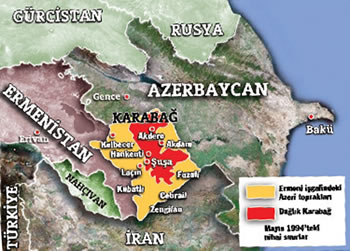

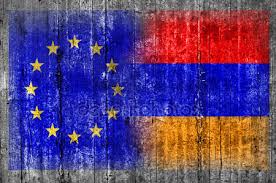


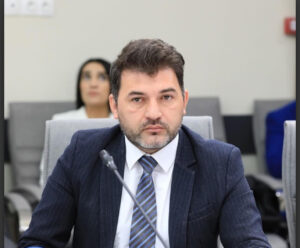
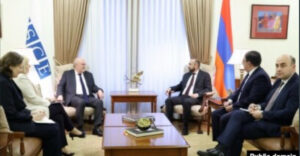
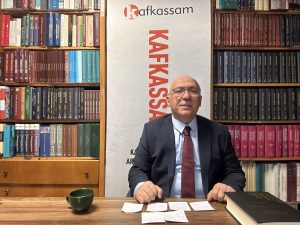
Yorum gönder